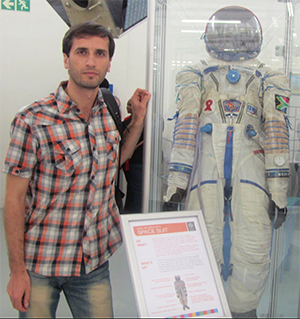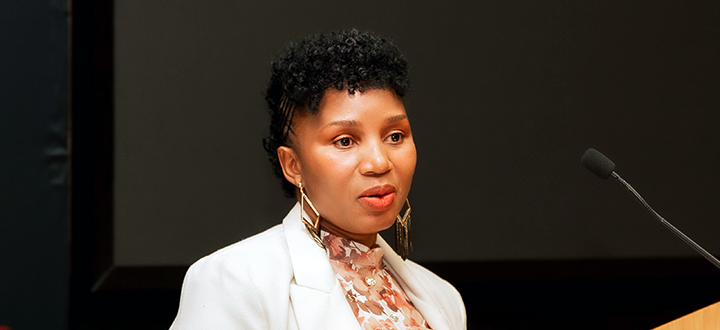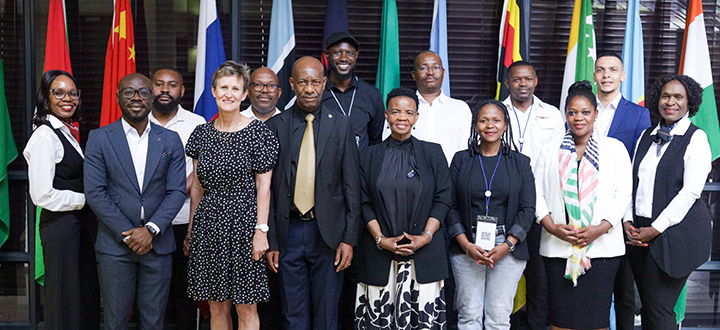College of College of Graduate Studies
Striving to find solutions in difficult times

Mahmood Akbari, a PhD student and fellow in the UNESCO-Unisa Africa Chair in Nanosciences and Nanotechnology, has advice to share with other postgraduate students who are keen on retaining their equilibrium, despite the current crisis.
The extended lockdown anti-coronavirus measures and regulations that have been imposed across the world have restricted what people do, and how they do it. For scientists worldwide, such restrictions initially meant little, or no, possibility of accessing experimental laboratories full-time.
Despite such conditions seeming to hamper the work of other laboratory scientists, Mahmood Akbari, a Unisa PhD student and fellow in the UNESCO-Unisa Africa Chair in Nanosciences and Nanotechnology (U2ACN2), together with Dr Razieh Morad, a postdoctoral research fellow of the chair, succeeded in initiating a joint research project together with scholars in other countries, aimed at proposing a way of treating Covid-19.
“We proposed a hybrid drug delivery system by simulation as a promising candidate for Covid-19 treatment that helps the experimentalist to overcome the pandemic,” says Akbari.
With the easing of the lockdown restrictions, their mutual hard work is now starting to gain momentum for all computational chemists and biophysicists to be able to model various approaches and to be able to propose efficient therapies for the experimentalist.
Joint research project for Covid-19
When Covid-19 was declared a global pandemic, and strict lockdown regulations were enforced worldwide, Akbari acted on the suggestion of his supervisor, Professor Malik Maaza, incumbent of the U2ACN2. Akbari, together with his team, chose to model and study the mechanism of coating proposed drugs such as artemisinin, artemether, artesunate, chloroquine, and hydroxychloroquine onto metal nanoparticles like silver, gold and platinum, whose antibacterial properties have already been proved to decrease the side-effect of the drugs concerned.
“Our modelling result on the study of the interaction and conjugation of artemisinin, artemether, and artesunate on silver nanoparticles has been published in the Journal of Nanoparticle Research,” said Akbari. In addition, the results obtained regarding the process of coating chloroquine (CQ) and hydroxychloroquine (HCQ) onto the metal nanoparticles of silver, gold and platinum are in the last step of the publication process in the Scientific Reports journal, which is an online peer-reviewed open access scientific mega-journal published by Nature Research.
Drive to nano
Akbari’s keen interest in nanoscience and nanotechnology first emerged during his bachelor degree studies in applied physics at Ferdowsi University Mashhad (FUM), situated in his home country, Iran. “Since nanotechnology improves existing science and engineering, it enables our relatively new ability to manipulate and characterize matter at the level of single atoms and small groups of atoms,” he said. This capability is the result of many developments that have taken place over the last two decades.
A fellow of the Nanosciences African Network (NanoAfNet), Akbari has already completed two master’s degrees, one in the field of Nanoelectronics at the University of Cape Town, and the other in the field of Atomic and Molecular Physics in Iran.
Throughout his studies, Akbari has been recognised for his exceptional research work, for which he has received numerous awards, with the most prominent being the Promotion Award of Nanotechnology (student section) of the Iran Nanotechnology Initiative Council and his earning of second place in the Nanotechnology Division at the 10th Scientific-Educational Festival of Students in Iran.
Enabling research environment
Under the guidance of Maaza, Akbari and Morad are currently involved with helping research groups make theoretical and modelling contributions to the advancement of nanoscience. In March 2020, the above researchers organised a two-day workshop in First-Principle and Atomistic Modelling in Materials Science at the iThemba Laboratory for Accelerator-Based Sciences (LABS), Cape Town. The workshop aimed to enable postgraduate students and postdoctoral researchers to become familiar with the new topics and concepts of materials modelling related to the nanoscale.
“It is my honour to work in such an outstanding research group. We get the benefit of attending national and international seminars, conferences, workshops, and schools to improve our skills and knowledge in the field of Nanoscience and Nanotechnology. Furthermore, we have been provided with chemicals and novel experimental equipment in a wide variety of labs at Unisa and iThemba LABS/NRF,” says Akbari. The chair also hosts distinguished scientists annually, with the research students/fellows at iThemba LABS having an opportunity to engage in discussions with them.
Until early 2020, attending physical contact conferences, lectures, and workshops and holding face-to-face discussions with others in the same and related fields was believed to be one of the best ways for postgraduate students and researchers to learn more about their subjects. “I believe Covid-19 has unpleasantly made everything virtual and could influence the motivation of all young researchers. At the beginning of the lockdown in South Africa, we were motivated to create a research group consisting of international scholars to have some contributions to fight against the invisible SARS-Cov-2 virus,” said Akbari. He mentioned that working on an up-to-date global issue within the ambit of a professional group inspired him, along with his fellow researchers, to keep their spirits high.
Research focus
Akbari’s main research projects during the last three years have focused on the following aspects of nanotechnology:
1) In 2020, Akbari modelled a hybrid system, as a drug delivery system containing some newly proposed drugs against Covid-19, which were loaded onto such metal nanoparticles as silver, gold, and platinum to reduce the toxicity and side-effects of the drugs.
2) In 2019, the researcher investigated the multifunctionality of vertical graphene nanosheets, including their surface tension, applicable as a supercapacitor, and their solar selective absorber abilities.
3) In 2018, the researcher studied the atomistic simulation of quantum transport in nano electronic devices, including the use of a field-effect tunnelling transistor, consisting of a few layers of hexagonal boron nitride (h-BN) sandwiched by graphene sheets.
You can learn more on Akbari’s research through a list of his publications on Google Scholar.
From one research student to another
I believe that, to reach the summit of a research journey, we must be passionate and positive, and that we must persevere. Especially international students, who have to face multiple language and cultural differences, may find their research journey challenging. I would like to remind postgraduate students that they must pursue a research topic which they are passionate about, so that they will be motivated enough to sustain their journey.
Doctoral research requires a unique set of educational and psychological skills. Unfortunately, research has demonstrated that mental illness is on the rise among academics (Shaw, 2014). Based on my own experience, I have the following advice to share with other postgraduate students who are keen on retaining their equilibrium, despite the current crisis:
1) Be aware of the negative impact of social isolation, and actively seek to expand your networks.
2) Join a group, like a book club, or a writing or research group.
3) Avoid perfectionism.
4) Take up a new hobby.
5) Seek to be challenged by opportunities that arise.
6) Strive to build strong relationships with your supervisors and supervisory committees.
As students, steer clear of perfectionism, which encourages the setting of unrealistic goals that might be beyond your reach, and which can lead to the development of anxieties, the fear of criticism and failure, and the inability to produce anything at all.
*By Mpho Moloele, PR and Communications Assistant, Department of Research, Innovation, and Commercialisation
Publish date: 2020-12-21 00:00:00.0


 Wings of opportunity: Bringing drones into the classroom
Wings of opportunity: Bringing drones into the classroom
 Visionary youth champion to address Unisa’s Innovation Festival
Visionary youth champion to address Unisa’s Innovation Festival
 Finding the strength to persevere
Finding the strength to persevere
 Disability awareness at Unisa: Disability is not inability
Disability awareness at Unisa: Disability is not inability
 Unisa symposium shares knowledge on building SA's aviation economy
Unisa symposium shares knowledge on building SA's aviation economy